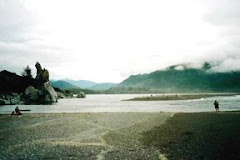On Thursday evening April 18th KlamBlog editor and long-time Klamath River activists Felice Pace will present “The Klamath Adjudication and the KBRA: Implications for tribal water rights, fish and wildlife” at the Klamath County Museum in Klamath Falls. The presentation – along with follow up q&a and discussion - will take place between 7 and 9 PM. The Klamath County Museum is located at 1451 Main Street in Klamath Falls, Oregon. The public is invited to attend.
The presentation is sponsored by the Klamath Claims Committee in order to inform and foster discussion among members of the Upper Klamath River Basin Community concerning developments which are of critical importance to the future of the Klamath River Basin and to natural and human communities throughout the basin. Members of the Claims Committee are all members of the Klamath Tribes - a single tribal government with members who are Indigenous Klamath, Modoc and Yahoskin natives.
The goal of the presentation is to cut through the public relations spin which has issued from several sources concerning the proposed Klamath Adjudication Order and the KBRA. It will clarify how the proposed Order and the KBRA are related as well as how both would impact tribal water rights if they become final as proposed by the State of Oregon.
The proposed Klamath Adjudication Order and KBRA will be placed within the context of a major push by the federal government beginning in the 1980s to settle existing and potential tribal water rights claims throughout the American West. It will focus on the State of Oregon’s denial of the Klamath Tribes’ claims to off-reservation water rights to support treaty hunting and fishing rights, including the denial of the tribe’s claims to flows in the Klamath River below Klamath Falls. This will include the likely impact of the proposed Adjudication Order and the KBRA on Klamath Salmon, Lost River and Shortnose suckers and on Klamath Wildlife Refuges should the Order and KBRA be adopted and implemented in their present form.
The presentation concludes with description of a plan and vision for restoration of the Klamath River Basin and recovery of treaty fisheries which is radically different from the vision embodied in the KBRA.
Early 1900s: Salmon Fishing at Link River below Upper Klamath Lake
The State of Oregon has denied the Klamath Tribes right to flows for salmon
The presentation is sponsored by the Klamath Claims Committee in order to inform and foster discussion among members of the Upper Klamath River Basin Community concerning developments which are of critical importance to the future of the Klamath River Basin and to natural and human communities throughout the basin. Members of the Claims Committee are all members of the Klamath Tribes - a single tribal government with members who are Indigenous Klamath, Modoc and Yahoskin natives.
The goal of the presentation is to cut through the public relations spin which has issued from several sources concerning the proposed Klamath Adjudication Order and the KBRA. It will clarify how the proposed Order and the KBRA are related as well as how both would impact tribal water rights if they become final as proposed by the State of Oregon.
The proposed Klamath Adjudication Order and KBRA will be placed within the context of a major push by the federal government beginning in the 1980s to settle existing and potential tribal water rights claims throughout the American West. It will focus on the State of Oregon’s denial of the Klamath Tribes’ claims to off-reservation water rights to support treaty hunting and fishing rights, including the denial of the tribe’s claims to flows in the Klamath River below Klamath Falls. This will include the likely impact of the proposed Adjudication Order and the KBRA on Klamath Salmon, Lost River and Shortnose suckers and on Klamath Wildlife Refuges should the Order and KBRA be adopted and implemented in their present form.
The presentation concludes with description of a plan and vision for restoration of the Klamath River Basin and recovery of treaty fisheries which is radically different from the vision embodied in the KBRA.



No comments:
Post a Comment